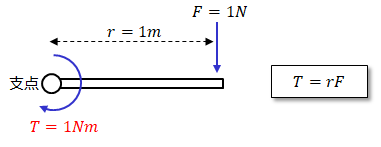Definition of force, torque, work, power |
|||||||
・Force,torque,work,power ・Acceleration ・Mass-spring-damper ・Moment of inertia ・Inverted pendulum ・Differential eq. for motors ・Slope angle ・Frictional force |
■Force [N,kgf]
According to Newton's law, mass m [kg], force F [N:Newton], and acceleration a [m/s2] are as follows.
■Torque [Nm]
As shown below, the force applied in the direction of rotation is called torque (or moment), and the torque when a force of 1N is applied from a point 1m away is defined as 1Nm (Newton meter).
When torque is T [Nm], distance is r [m], and force is F [N], the following relationship holds true. ■Power [PS , J/s , kW]
Power is work done per unit time. 1W = 1J/s.
■Work [Nm , J , kWh]
Work is force (N) multiplied by distance (m), so the unit is Nm, and 1Nm = 1J(Joule) (=0.239cal). Also, 1J is defined as 1W output for 1 second.
Although the torque explained above is also the same unit, they are different.
The work of a rotating object is defined as the force multiplied by the rotational distance [rad]. ■Difference between work and energy
Work and energy both have the same unit [J], but they are different; energy is the ability to do work.
For example, if an object with 100 J of energy does 10 J of work, the energy remaining in the object will be 90 J.
The reverse is also true; if you do an additional 10 J of work on an object with an energy of 90 J, the energy of the object becomes 100 J.
|
|
|||||







